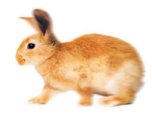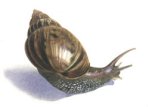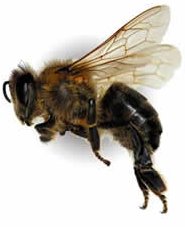





Giant African Snail (1990's):
A crate of 1,000 giant African snails was recently smuggled from Lagos, Nigeria, to the United States. The baseball sized slugs were then sold to exotic pet dealers in twenty-five states. If it escapes into the wild, a single slug can reproduce itself (they're hermaphrodites) 16 quadrillion times in five years! The snail, which weighs up to a pound, can eat an entire head of lettuce in one sitting-"It eats anything," said one zoologist - including house paint, rats, and beer.
A crate of 1,000 giant African snails was recently smuggled from Lagos, Nigeria, to the United States. The baseball sized slugs were then sold to exotic pet dealers in twenty-five states. If it escapes into the wild, a single slug can reproduce itself (they're hermaphrodites) 16 quadrillion times in five years! The snail, which weighs up to a pound, can eat an entire head of lettuce in one sitting-"It eats anything," said one zoologist - including house paint, rats, and beer.
Walking Catfish (1967):
Imported originally from southeast Asia as an aquarium fish, the catfish escaped from breeding tanks in Florida. Able to breathe and crawl on land, this fish is aggressive and can eat other fish up to seven inches long.
Imported originally from southeast Asia as an aquarium fish, the catfish escaped from breeding tanks in Florida. Able to breathe and crawl on land, this fish is aggressive and can eat other fish up to seven inches long.
Nile Perch (1962):
Officials of Ugandan and Kenyan fisheries, hoping to increase Lake Victoria's output of food, stocked it with the Nile perch. But the voracious perch killed off many of the indigenous fish. Overfishing and pollution contributed to the problem, and now 300 species of fish have vanished from the lake.
Officials of Ugandan and Kenyan fisheries, hoping to increase Lake Victoria's output of food, stocked it with the Nile perch. But the voracious perch killed off many of the indigenous fish. Overfishing and pollution contributed to the problem, and now 300 species of fish have vanished from the lake.
Africanized Bee (1957):
Thirty five years after it was introduced into Brazil and escaped from a breeding experiment, the killer bee arrived in Texas, and was spreading north. During its migration the bee has killed hundreds of people and has caused a falloff in honey production. The best way to cope with a killer bee attack is to run in a zig zag motion.
Thirty five years after it was introduced into Brazil and escaped from a breeding experiment, the killer bee arrived in Texas, and was spreading north. During its migration the bee has killed hundreds of people and has caused a falloff in honey production. The best way to cope with a killer bee attack is to run in a zig zag motion.
Classic reasons why man should never mess with mother nature and the environment:
Giant Toad (1930's):
This eight inch toad was introduced into Australia to aid farmers in controlling the sugar cane beetle. But the toad, which secretes a deadly poison, became a menace to dogs, cattle, sheep, and other domestic animals. By the 70's the Australian government was offering a bounty for the toad.
This eight inch toad was introduced into Australia to aid farmers in controlling the sugar cane beetle. But the toad, which secretes a deadly poison, became a menace to dogs, cattle, sheep, and other domestic animals. By the 70's the Australian government was offering a bounty for the toad.
Starling (1890):
Sixty of the birds were released in New York's Central Park by a group that planned to bring to the United States all of the birds mentioned in Shakespeare's works. The starlings multiplied and
Sixty of the birds were released in New York's Central Park by a group that planned to bring to the United States all of the birds mentioned in Shakespeare's works. The starlings multiplied and
Gypsy Moth (1866, 1991):
A French scholar visiting Harvard University allowed several caterpillars to escape. They soon multiplied and spread throughout New England, attacking trees and stripping their leaves. In 1991 thirty-five Asian Gypsy Moths entered the United States and British Columbia, apparently as stowaways aboard a group of Russian freighters. The newly hatched caterpillars climbed up to the highest point on the ship and were blown ashore. They are far more destructive than the European moth, which defoliates 4 million acres annually in the American Northeast. The Asian moths could cause $55 billion dollars of damage over the next forty years.
A French scholar visiting Harvard University allowed several caterpillars to escape. They soon multiplied and spread throughout New England, attacking trees and stripping their leaves. In 1991 thirty-five Asian Gypsy Moths entered the United States and British Columbia, apparently as stowaways aboard a group of Russian freighters. The newly hatched caterpillars climbed up to the highest point on the ship and were blown ashore. They are far more destructive than the European moth, which defoliates 4 million acres annually in the American Northeast. The Asian moths could cause $55 billion dollars of damage over the next forty years.
European Wild Rabbit (1859):
An Australian farmer freed these creatures, hoping to turn a profit from their pelts and meat. Within
An Australian farmer freed these creatures, hoping to turn a profit from their pelts and meat. Within

"But We Meant Well!" - When Man Tries To "Help" Mother Nature....


by the late 1950's they had invaded all of North America, taking over the nests of songbirds and damaging grain and fruit crops.
three years, the rabbit was a national catastrophe, turning grassland into desert, rendering it useless to livestock and to many native marsupials. Today, the rabbit population is finally controlled.
Pet Meds: Dogs | Pet Meds: Cats | Dog Health : By Breed | Cat Health : By Breed | Dog Grooming | Cat Grooming | Pet Top 10's | Pet Food Recipes
Pet Meds: Dogs Pet Meds: Cats Common Dog Health Issues Common Cat Health Issues Dog Grooming Cat Grooming Pet Top 10's
Pet Health:Home
Copyright 2006-2011 PetMedsOnline.Org
Back To Pet Top 10's
From the friendliest cat breeds to the least intelligent dogs (and everything in between), you'll find it all on our "pet top 10's" pages!
From the friendliest cat breeds to the least intelligent dogs (and everything in between), you'll find it all on our "pet top 10's" pages!

